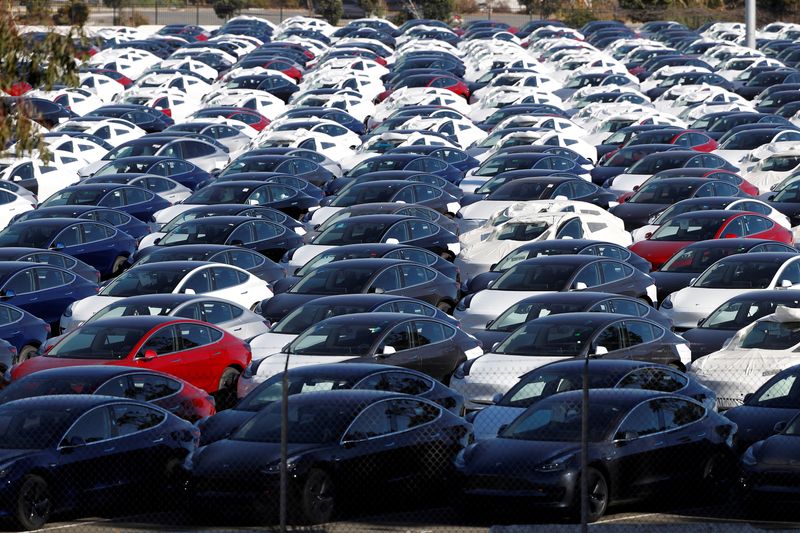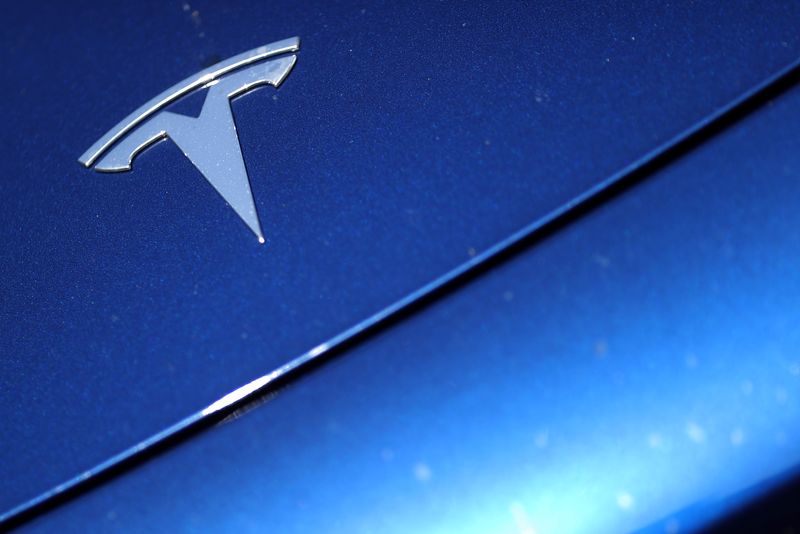By Nick Carey and Marie Mannes
LONDON (Reuters) -Tesla is working to appease some European leasing companies after the automaker’s repeated retail price cuts tanked their fleets’ value and its slow service and expensive repairs alienated their corporate customers.
The efforts include unofficial discounts on purchases of new cars if they are in stock and efforts to address widespread service, repair and ordering complaints after years in which fleet managers and leasing firms say Tesla (NASDAQ:TSLA) has ignored those problems, according to Reuters interviews with nine executives from major leasing and rental-car firms, along with about a dozen corporate fleet managers.
Tesla’s retail price cuts aimed to bolster sales in response to softening electric-vehicle demand globally and rising competition, especially from Chinese EV makers such as BYD (SZ:002594). But that damaged the bottom lines of its biggest customers in Europe — where fleet purchases represent nearly half of auto sales.
Leasing companies buy new cars and arrange leases calculated on how much they believe they can sell them for at the end of the lease. Sudden drops in price undercut those residual values, costing leasing firms money.
There’s "nothing worse" than continuously dropping the value of a fleet buyer’s assets, said Richard Knubben, director general of Brussels-based Leaseurope, a leasing- and rental-industry group which represents national groups across 31 countries.
"Tesla is now actively telling our members: We can give you discounts and compensate you," Knubben said. "But Tesla's residuals have dropped so fast, I'm not sure the discounts they're offering are enough."
Tesla did not respond to requests for comment.
Tesla’s falling resale values and tensions with fleet customers are known but its damage-control campaign to address them has not been previously reported.
A top executive at a large European car-leasing firm, who spoke on condition of anonymity because he did not have permission to comment publicly on Tesla, said that, starting in mid-2023, Tesla offered unofficial end-of-quarter discounts on its Model 3 and Model Y by up to 2,000 euros ($2,134) for leasing-company purchases, if those vehicles were in stock.
Since late last year, he said, those discounts have been available all the time.
Tim Albertsen, CEO of Ayvens — Europe's largest auto-leasing company with a fleet of 3.4 million cars, about 10% of which are EVs — said Tesla’s service has improved but its falling resale values have been damaging. "Tesla has understood that and is coming with solutions that help us with that," he said.
Albertsen declined to elaborate on what Tesla has done to mitigate Ayvens’ losses on EVs.
Arval, the car-leasing unit of BNP Paribas (OTC:BNPQY)', is now talking to three Chinese automakers about buying EVs after taking losses tied to declining Tesla values. When Tesla first started cutting prices last year, Arval told the automaker: “You are really shooting yourself in the foot,” said Arval Deputy CEO Bart Beckers.
Arval leases about 170,000 EVs as part of its 1.7 million-vehicle fleet, Becker said. He said Tesla is working to fix repair-and-service problems but added the automaker’s “new challengers” — Chinese EV makers — seem to be avoiding Tesla’s mistakes by focusing on maintaining strong resale values for cars.
The automaker faces the same resale-value problem with rental-car companies. Hertz has been selling off Teslas in the U.S. market, while German rival Sixt has stopped buying them. Asked about the impact of Tesla’s price cuts, Sixt said lower residual values on EVs from Tesla and other brands reduced its 2023 earnings by 40 million euros ($42.7 million).
CRITICAL CUSTOMERS
Fleet customers are important in any automotive market but especially so in Europe, where firms often lease large numbers of company cars for employees, in part because of associated tax breaks. Leasing and rental-car company purchases comprised 44% of Tesla sales last year in the UK and 15 EU countries, according to market research firm Dataforce.
Tesla’s first-quarter fleet sales in those countries fell 2.3% while the market as a whole was up 3.5%. Even as its fleet sales fell, leasing companies’ and rental car firms’ share of Tesla’s business in those markets rose to 49%.
Tesla's sales and profits are falling globally after a long period of sharp growth. The automaker reported an 8.5% drop in global deliveries during the first quarter, its first decline in four years.
The decline in fleet sales in those 16 European countries comes after 57% growth in 2023, over the previous year, according to Dataforce. Tesla posted the same percentage growth for all sales across Europe, according to the European Automobile Manufacturers Association.
Until recently, Tesla had a first-mover advantage that meant European corporate customers had few alternatives for EVs to meet internal climate goals or EU emissions targets.
That’s changing swiftly. Chinese automakers including BYD are bringing lower-cost electric models to Europe and aggressively courting Tesla's corporate customers, according to fleet managers, along with executives from leasing firms. Legacy automakers such as Volkswagen (ETR:VOWG_p) and BMW (ETR:BMWG) are also producing increasingly competitive EVs.
‘PENT-UP FRUSTRATION’
Slow and expensive Tesla service has been another sore point with European leasing companies and their customers, according to Reuters interviews with about a dozen corporate fleet managers. Most declined to be identified because they are actively seeking to resolve problems with Tesla.
Its repairs take too long and cost far more than other vehicles, partly because of pricey parts, they say.
Even so, Tesla does have satisfied fleet customers.
Octopus Electric Vehicles, the car-leasing arm of UK energy firm Octopus Energy, has about 5,000 Teslas among about 15,000 EVs. CEO Fiona Howarth said that Tesla, as an EV pioneer, needed time to figure out service operations and that legacy automakers now face similar challenges with their own EVs. She said Tesla resale values were artificially high during the coronavirus pandemic and needed to come down.
"We've had a really good working relationship with Tesla," she said.
Lorna McAtear, fleet manager at UK energy firm National Grid (LON:NG), described much rockier relations with Tesla. She’s been compiling data on repair costs and found Tesla’s to be triple the industry average.
Other problems, McAtear said, include a cumbersome ordering system and cars arriving with defects. For instance, she said, Tesla delivered a number of EVs with warped windshields and declined to fix them under warranty.
National Grid has more than 500 Teslas in its company-car fleet of 2,000 vehicles. McAtear said she has planned to propose her company drop Tesla from its fleet unless the problems are addressed. Meanwhile, Tesla’s chief Chinese rival, BYD, is starting to deliver cars to National Grid.
McAtear said she pushed for a face-to-face meeting with Tesla representatives in mid-April. During that meeting the automaker promised service improvements and an ordering-system fix, along with additional meetings and a “roadmap” for resolving outstanding problems leaving McAtear feeling like "we finally have customer service."

The automaker has been unresponsive in the past, she said: "There have been years of pent-up frustration that fleets can't talk to Tesla."
($1 = 0.9373 euros)
